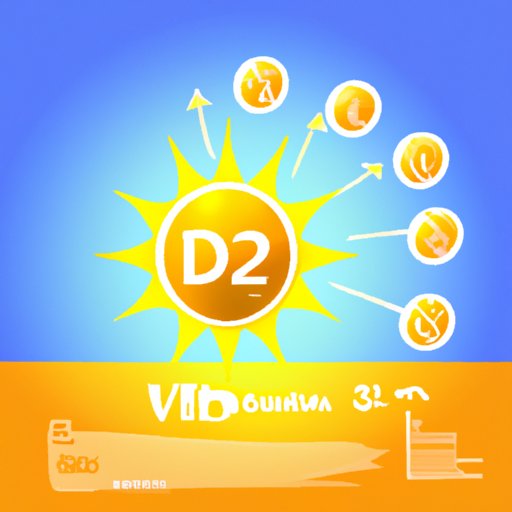Introduction
Vitamin D3, also known as cholecalciferol, is an essential nutrient for overall health and wellbeing. It is sometimes referred to as the “sunshine vitamin” because it is produced in the body when exposed to sunlight. Vitamin D3 plays a key role in promoting strong bones, healthy immune function, and preventing certain diseases. This article will explore the benefits of vitamin D3, sources of the nutrient, and tips for getting enough of it in your diet.
Vitamin D3: The Sunshine Vitamin and Its Health Benefits
Vitamin D3 is important for many aspects of health and wellness, including bone health, immunity, and disease prevention. Here are some of the key benefits of vitamin D3:

How Vitamin D3 Supports Immunity and Overall Health
Vitamin D3 helps to support the immune system by increasing the production of white blood cells, which are necessary for fighting off infection. Vitamin D3 also helps to regulate calcium levels in the body, which is important for maintaining strong bones. In addition, research suggests that vitamin D3 may have protective effects against certain chronic illnesses, such as cancer, diabetes, and heart disease.
How Vitamin D3 Can Help to Prevent Diseases
Vitamin D3 has been shown to help reduce the risk of several types of cancer, including colorectal cancer, breast cancer, and prostate cancer. It can also help to reduce the risk of type 2 diabetes, as well as cardiovascular disease. Vitamin D3 may also help to protect against autoimmune diseases such as multiple sclerosis and rheumatoid arthritis.

How to Get Enough Vitamin D3 in Your Diet
Getting enough vitamin D3 in your diet is important for overall health and wellbeing. Here are some tips for ensuring you get enough vitamin D3:
Foods That Contain Vitamin D3
Certain foods are rich in vitamin D3, including fatty fish such as salmon, mackerel, and tuna. Other foods that contain vitamin D3 include egg yolks, fortified milk, and mushrooms. Supplementing with a multivitamin can also help you get enough vitamin D3.
Other Ways to Increase Vitamin D3 Intake
In addition to eating foods that contain vitamin D3, there are other ways to increase your intake of the nutrient. Spending time outdoors in the sun can help your body produce vitamin D3 naturally. You can also take a vitamin D3 supplement or use a tanning bed to increase your vitamin D3 levels.

Vitamin D3: The Benefits and Risks of Supplementation
While vitamin D3 supplements can be beneficial, they can also carry certain risks. Here are some pros and cons of taking vitamin D3 supplements:

Pros and Cons of Vitamin D3 Supplements
The main benefit of taking vitamin D3 supplements is that they can help to ensure you get enough of the nutrient in your diet. However, taking too much vitamin D3 can lead to side effects such as nausea, vomiting, and diarrhea. It is important to speak to your doctor before taking any vitamin D3 supplements.
Side Effects and Interactions With Other Medications
It is also important to note that vitamin D3 supplements can interact with certain medications. For example, calcium-containing medications can interfere with the absorption of vitamin D3. It is important to talk to your doctor before taking any supplements, as they can help you to determine the right dosage for your individual needs.
Vitamin D3 Deficiency: Causes, Symptoms, and Treatment
Vitamin D3 deficiency is relatively common, and it can lead to a variety of health problems. Here are some risk factors, signs, and symptoms of vitamin D3 deficiency, as well as tips for treating it:
Risk Factors for Vitamin D3 Deficiency
Certain people may be at higher risk for vitamin D3 deficiency, including those who are elderly, have darker skin, or spend little time outdoors. People with digestive problems, such as Crohn’s disease or celiac disease, may also be at higher risk for vitamin D3 deficiency.

Signs and Symptoms of Vitamin D3 Deficiency
Vitamin D3 deficiency can cause a variety of symptoms, including fatigue, muscle pain, joint pain, depression, and weakened bones. If left untreated, vitamin D3 deficiency can lead to more serious health problems, such as osteoporosis and rickets.
Treating Vitamin D3 Deficiency
If you think you may be deficient in vitamin D3, talk to your doctor. They can test your levels and recommend treatment options. Treatment for vitamin D3 deficiency may include dietary changes, exposure to sunlight, and vitamin D3 supplements.
Conclusion
Vitamin D3 is an essential nutrient for overall health and wellbeing. It helps to promote strong bones, healthy immunity, and can help to prevent certain diseases. Getting enough vitamin D3 in your diet is important, and can be achieved by eating foods that contain the nutrient, spending time outdoors in the sun, or taking a supplement. If you think you may be deficient in vitamin D3, talk to your doctor for advice on treatment options.


